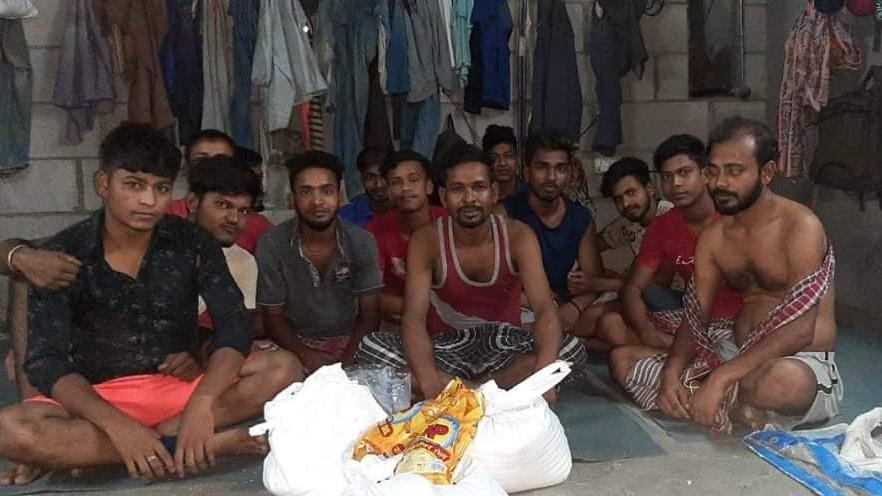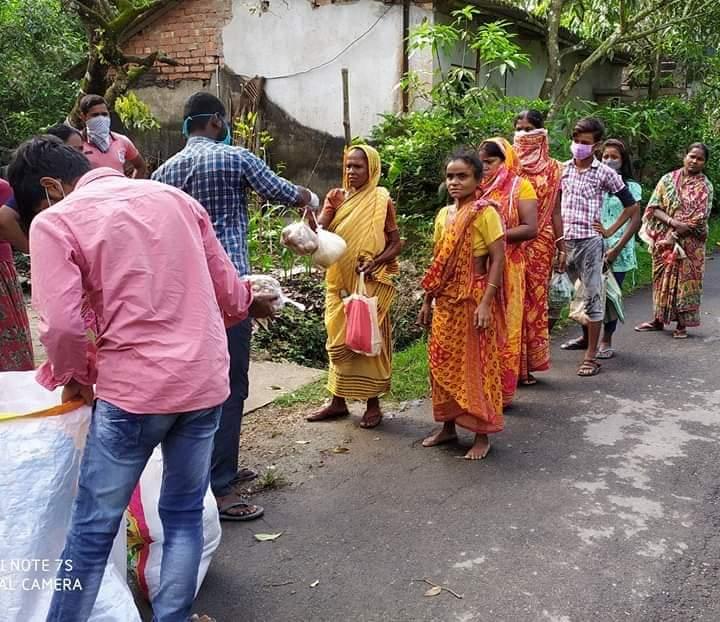COVID-19 Lockdown: Data Show 70K Bengali Migrant Workers Stranded, Centre, State Turn a Blind Eye

A group of workers who contacted Bangla Sanskriti Mancha.
One of the key roadblocks in facilitating the return of distressed migrant workers under the lockdown is the lack of precise data on their number, and the locations where they are stranded. As per the May 1 order of the Home Ministry, every state is required to collect this data and share it with the state governments where its workers are stranded. The West Bengal government has set up a helpline, app and website to register travel requests from stranded persons, but like in the case of other states, they are riddled with glitches and bugs and rarely work.
While there is no information in the public domain on the number of requests processed through these governmental interventions, data collated by Bangla Sanskriti Mancha and reviewed by NewsClick shows more than 70,000 migrant workers from the state are stranded in different parts of the country, and are desperate to return home.
This data, with details of precise locations of stranded workers, were submitted to the state as well as the central government on two occasions. Both times, there was no response from either government, raising questions over their keenness to come to the aid of migrant workers who have been pushed to be brink by loss of jobs, wages, hunger, discrimination, anxiety and homesickness.
Head start on documentation
Founded in 2017, Bangla Sanskriti Mancha (BSM) has a strong presence in several districts of West Bengal where out-migration is high. Over the past three years, the group has assisted migrant workers from these areas in various ways, including supplying them with food and ration during riots or natural disasters and organising the return of 30 migrants from Kashmir following the abrogation of Article 370 in 2019.

Bangla Sanskriti Manch distributing ration to people during the COVID-19 lockdown.
The first of BSM’s 12 helpline numbers to assist migrant workers went live two days after the first nationwide lockdown was declared on 24 March. “We asked people in the area who had our personal numbers to pass them on to their family members in other states, who then passed them on to other workers. We also circulated our numbers on social media,” Samrat Amin, a teacher at Barasija High School in Birbhum and a BSM member in charge of one of the helplines told NewsClick.
“We started receiving numerous distress calls within hours. Typically, it was one person who called on behalf of a larger group, saying they had run out of food and money, and we began coordinating with governments and civil society groups in other states to make necessary arrangements,” said Malda-based Md Ripon Sheikh, a third year BSc student, BSM member and helpline operator.
“Some callers imagined we were government officials and abused us profusely for not arranging their return, especially since Shramik Special trains started on 1 May. But many more broke down, and almost everyone said they wanted to return home,” said Halim Hoque, a BSM member and helpline operator.
Amin, Sheikh, Hoque and volunteers who operated helplines told NewsClick they spent 12-14 hours every day attending calls and logging data on computers till the second week of May, when the government helpline to register travel requests became operational.
What the data shows
BSM has worked to provide relief to about 35,000 migrant workers who called in from other states, largely with support from civil society groups.
“We knew that the state had no database of migrant workers, and would be unable to come to their aid without precise information,” Ajay Ray, one of BSM’s founding members and a PhD scholar at IICS told NewsClick. In due course, the volunteers updated the list to include the name, AADHAAR number and current address for every stranded migrant worker.
The data collated thus far shows over 70,000 workers from the state are stuck in different parts of the country. Most migrants are from districts that have few employment opportunities, like Birbhum, Malda, Murshidabad, North and South 24-Parganas, Howrah and Hooghly. The states that have the largest numbers of migrant workers from West Bengal include Maharashtra, Karnataka, Kerala, Tamil Nadu, Delhi and Punjab.
Turning a blind eye
An email was sent to the West Bengal chief secretary Rajiva Sinha on 29 March, barely three days after the government operationalised its helplines. Details of 8,000 stranded workers was collated by then, and shared with the state government, asking for its urgent intervention in bringing them back, and arranging for their food and shelter in other states for the interim period.
“A few workers got calls from the government, but that was about it. Since workers received no help, we wrote to Chief Minister Mamata Banerjee on April 17, sharing details of 34,000 stranded workers,” Ray told NewsClick.
This time too, the government promised help, but did not follow it up with action. On April 25, a month into the lockdown, an email was sent to Home Secretary Ajay Bhalla, requesting Home Ministry’s intervention in attending to the short-term and long-term needs of 45,000 migrant workers from the state stranded in various parts of the country, including in states like Manipur.
But there has been no response. On May 8, it sent another email to Bhalla, this time sharing the details and location of 70,000 migrant workers from West Bengal, but to no avail.
Question mark over intent
The failure of the Trinamool Congress state government and the BJP government at the Centre to acknowledge and act raises serious questions over the intent of both governments in coming to the aid of migrant workers.
These lists, updated with the AADHAAR numbers of migrant workers, were shared with political leaders from a number of areas as well. While most promised to look into the matter, governments seem to be doing little to help the workers with food, money or assistance in returning home.
The crisis for migrant workers, meanwhile, continues to deepen. On May 10, BSM received information about the first suicide by a distressed migrant worker from the state. Eighteen-year-old Asif Iqbal worked at a brick kiln in Kerala, where facilities for migrant workers are relatively better than other states. Homesick for several weeks, he hanged himself around 5 am that morning, his co-workers told volunteers over a call.
BSM President Samirul Islam told NewsClick that when they called Asif’s uncle to inform him of the unfortunate incident, he wondered if the lockdown was only meant for the poor. “He told us, ‘The rich are buying expensive liquor and their children are being brought back from foreign countries by flight. While our children die waiting, desperate yet unable to return home’,” recalled Islam.
“How many more deaths like this will it take for governments to realise that migrant workers need urgent help?” he asked.
Also read: MP: Data Leak in Govt’s COVID-19 App, Taken Offline
Get the latest reports & analysis with people's perspective on Protests, movements & deep analytical videos, discussions of the current affairs in your Telegram app. Subscribe to NewsClick's Telegram channel & get Real-Time updates on stories, as they get published on our website.
























